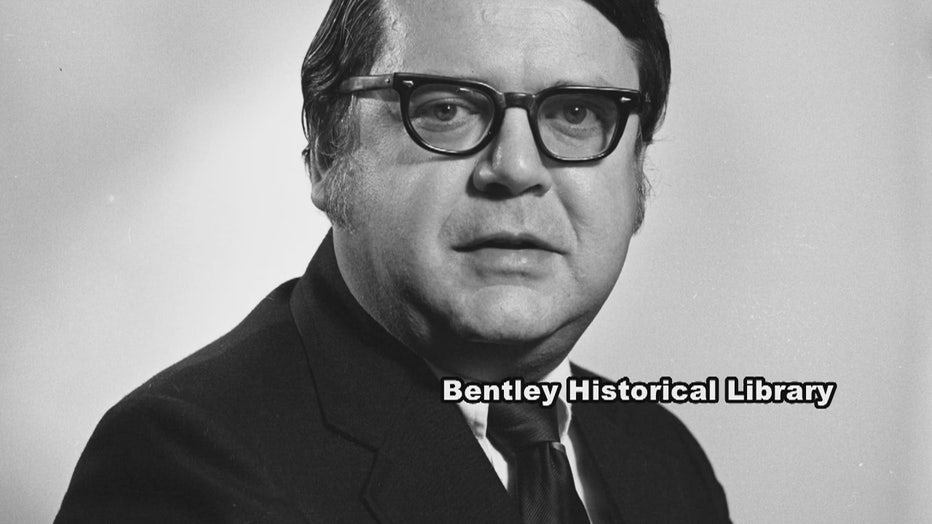Investigation: University of Michigan failed to address reports about doctor who assaulted hundreds

New investigation says University of Michigan had warnings of doctor's sexual abuse
An investigation into sexual assault allegations against a now-deceased University of Michigan doctor found that the school failed to address concerns about him.
ANN ARBOR, Mich. (FOX 2) - An investigation into sexual assault allegations against a now-deceased University of Michigan doctor found that the school failed to address concerns about him.
According to a report detailing the investigation, numerous sources reported Dr. Robert E. Anderson's behavior to the university on multiple occasions, but the doctor remained employed by the school and continued working with patients.
MORE: U-M sex assault survivors share 'horror stories' of Robert Anderson abuse
Anderson was hired by the university in 1966. He worked for the university for nearly four decades before retiring in 2003. He died in 2008.

Dr. Robert E. Anderson
While the report noted that the misconduct was reported when it was actively happening, a former student's letter three years ago prompted an investigation that led to the report's findings.
An alum who wrestled at the university in the 1970s, Thomas DeLuca, sent a letter to athletic director Warde Manuel in 2018 alleging that he was touched inappropriately by Anderson while receiving treatment from him. DeLuca said he saw Anderson once for cold sores on his face and another time for a dislocated elbow. Both times, Anderson is accused of performing a hernia check, as well as prostate and rectal exams.
Another former student and patient of Anderson came forward in 2019 to describe his interactions with Anderson. The student, a gay man, said Anderson had asked him to touch him inappropriately. The student said he shared the experience with another gay student and was told it was common practice from Anderson.
An investigation was conducted. It was completed in February 2020 and no criminal charges were filed by the Washtenaw County Prosecutor’s Office.
After that, the school established a hotline to collect information about other experiences with Anderson. More than 100 people called the hotline within two weeks.
In March of last year, the Board of Regents of the University of Michigan requested Wilmer Cutler Pickering Hale and Dorr LLP to conduct an investigation.
The investigation included interviewing hundreds of former students and employees, as well as a review of documents and consultation with medical records to determine if what Anderson was accused of doing to patients was to be expected during routine exams.
The report concluded that "Dr. Anderson engaged in a pervasive, decades-long, destructive pattern of sexual misconduct."
According to the investigation report, "approximately one hundred patients described inappropriate prostate or rectal examinations; nearly 150 patients detailed inappropriate hernia and/or genital examinations; and a half-dozen patients told us about inappropriate breast and/or pelvic examinations."
The report noted that while hundreds of victims have come forward, they may only represent a fraction of the victims.
The investigation found that many students were unsure if the exams Anderson performed were normal. Other students feared not receiving treatment they needed if they reported Anderson, according to the investigation, while others who were gay but not openly out were scared that speaking up about what happened could out them. Some student-athletes also feared they could lose their scholarships or playing time if they spoke up, the report said.
Read More: Sex assault survivors share their stories of U-M doctor Robert E. Anderson's abuse
The report also said that there were rumors on campus about Anderson's misconduct, and students would refer to him by nicknames such as "Dr. Drop Your Drawers Anderson." His behavior was allegedly reported to several school officials, including athletic department personnel.
It alleged that in the late 1970s, Anderson's behavior was reported to the assistant vice president of student services, Thomas Easthope, who oversaw the University Health Service.
According to the report, Easthope claimed he confronted Anderson and fired him. However, the investigation found that Anderson voluntarily resigned as UHS director in January 1980, but continued working at UHS as a senior physician.

The report claims that Easthope signed documents for Anderson to continue working and approved a salary increase for him after hearing reports of his misconduct.
Easthope allegedly received another complaint about Anderson in the early 1980s and said he would remove the doctor from patient-facing roles, but did not do so, the report says.
According to the report, Easthope told investigators that he did not remember that complaint, but the investigation showed it was true.
University of Michigan President Mark Schissel and the Board of Regents released a statement on May 11, 2021, addressing the findings of the investigation.
The investigation report including suggestions for how the university could move forward and advice for preventing future incidents.
These recommendations include:
- Enhance its training programs to promote a culture of awareness and reporting
- Enhance resources, training, and policies relating to sensitive examinations
- Assess how individual departments respond to sexual misconduct issues to increase their accountability
- Enhance certain diligence procedures to ensure that concerning information about physicians is adequately investigated;
- Improve communication and coordination between and among OIE, DPSS, and the Prosecutor’s Office; and
- Ensure that OIE has sufficient resources to carry out its important responsibilities.

